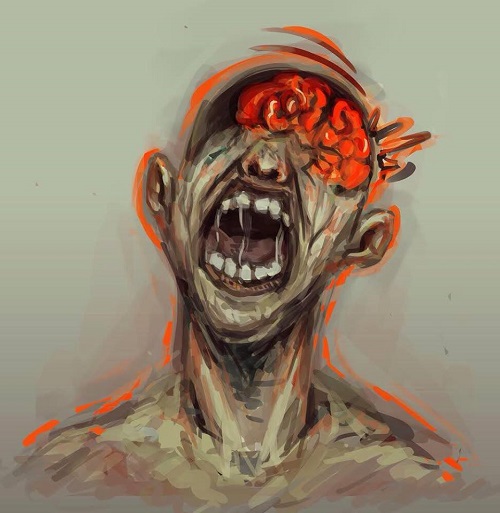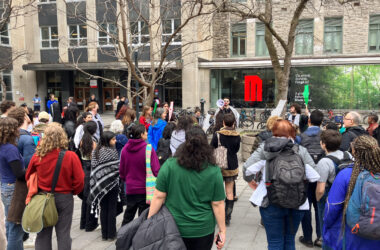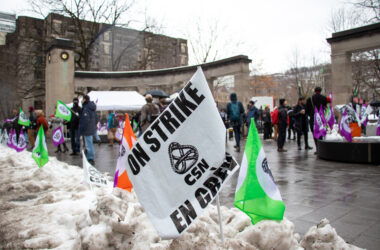In 1962, Montreal resident Marilyn Rappaport’s sister was admitted to the Allan Memorial Institute (AMI) at McGill University to treat a minor psychological condition. Instead of receiving the expected care, however, she was subjected to a number of experimental procedures including 107 electric shock treatments and multiple drug-induced comas. Additionally, she underwent intense psychic driving: a treatment which consists of repeated audio messages being played to a patient while they are under the influence of LSD in an attempt to alter their behaviour. When she was discharged in 1964, she had no recollection of who she was, and, to this day, she has no memory of her life before the experiments. The Rappaports have joined other victims who continue to feel violated, and they are in the process of forming a class-action lawsuit against the Government of Canada, the Government of Quebec, and McGill University.
Rappaport’s sister was a victim of MK Ultra subproject 68: A series of experiments carried out during the 1950s and 60s by the Government of Canada in coordination with the US’ Central Intelligence Agency (CIA). Unsuspecting patients like Rappaport’s sister were admitted for routinely-treated conditions such as anxiety or postpartum depression and were then subjected to psychedelic experiments without their consent.
“They basically fried her brain, […] because when she was […] finally discharged, she came home and was telling my mother that she was not my mother,” Rappaport said in an interview with The McGill Tribune. “Today, my sister is 77 years old, and when I visit her, she’s telling me that I’m not her sister. This needs to be corrected because it was criminal and there was no informed consent given.”
Julie Tanny, another Montreal resident, had her father recommended to the AMI in 1957 for treatment for Trigeminal Neuralgia, a neurological condition resulting in shock-like pain which is usually concentrated on one side of the face. By the end of the year, his memory had also been completely erased.
“My own father was not the same person when he came out,” Tanny said. “[He] didn’t even know who he was–never mind who we were–and I don’t know if he learned [who we were] all over again or if his memory came back [….] He was a very different man, he was very high-strung…,angry, [and] aggressive.”
During its time in operation, hundreds of Canadians filed through the doors of the AMI; although, the Government of Canada has yet to acknowledge or apologize for the long-term consequences for its subjects. Instead, families have taken matters into their own hands and formed the Survivors Allied Against Government Abuse (SAAGA) last February with the goal of demanding an apology and compensation from the government. SAAGA met for the first time in May, with approximately 40 members in attendance. They estimate that the lawsuit will take another four to six months to manifest, as it is pending approval from the Quebec Superior Court.
Prior to the founding of SAAGA, organized public responses to the MK Ultra Canadian subproject have been few and far between. In 1986, Halifax Member of Parliament George Cooper was tasked with investigating the effects of the experiments, and his final report allegedly found the Canadian Government to be clear of any legal responsibility. Nonetheless, in 1992, the national government implemented the Depatterned Persons Assistance Plan, which provided $100,000 to those who could prove that the experiments had reduced them to a ‘child-like’ state. Out of the 332 who applied, only 77 were granted compensation.
“Although the Cooper Report concluded that the Government of Canada was not responsible, it did suggest parameters to provide victims with financial assistance,” Ian McLeod, acting media relations manager of Justice Department Canada, wrote in an email to the Tribune. “The Depatterned Persons Assistance Plan was set up on a humanitarian and compassionate basis to provide victims of these experiments with an ex gratia payment.”
Finding Canada’s response unacceptable, the victims and their families have turned to Montreal lawyer Alan Stein to represent them in their case. Stein had previously succeeded in attaining compensation for Alison Steel in 2017, whose mother was a victim of the experiments. In an interview with the Tribune, Stein explained that, although the case is complicated, he believes that the experiments were illegal.
“It’s a tough case,” Stein said. “ I think [that] the weight of certainty of expert psychiatric opinion is that the treatment and the experiments […were] tantamount to a criminal act [….] They had mental problems, it’s true, but when they came out they were a lot more sick than when they went in.”










Who do I talk to if I’m being targeted on Facebook ?
Besides McGill, there needs more transparency and accountability of other institutions such as the Toronto HSC, where neurologically disabled children are exploited for various non-consensual brain surgical experiments. Something remains quite sinister, when access to all medical records are denied due to being a national security issue, which is the same excuse, for not disclosing JFK’s missing brain tissue. Disturbing I have evidence of a non-consensual left temporal lobe brain tissue transplant Dec. 9,1969, at 14 years of age, and such nefarious child abuse, being concealed under the national security act. Bear in mind, the left temporal lobe is responsible for memory. I am always reminded, that the very word secrecy is repugnant in a free and open society. Let there be light.